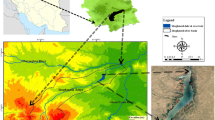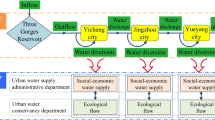Abstract
The purpose of this research is to use the multi-criteria decision-making (MCDM) of Combinative Distance-Based Assessment (CODAS) to select the best game theory method for agricultural and environmental water stakeholders (as players of games theory) in order to optimally allocate water from the Idogmosh dam reservoir (Iran). For this purpose, water optimal allocation were extracted using the Marine Predator Algorithm (MPA) for two periods of 14-year base and climate change. In this research, bankruptcy theory [Including (1) Proportional (PRO), (2) Adjusted Proportional (AP), (3) Constrained Equal Award (CEA), (4) Constrained Equal Loss (CEL)], and dispute resolution theory [(5) (NASH)] are used. The selection of the best game theory method is based on 10 reservoir performance indexes (as evaluation criteria). Then, these criteria are weighted separately by the Step Wise Weight Assessment Ratio Analysis (SWARA) method. In the last step, five different game theory methods are prioritized for each of the agricultural and environmental players using the CODAS decision-making method. The results show that the best game theory method for the agricultural player in the base and future time periods is the Nash method, with an evaluation score of 0.108 and 0.099, respectively. Also, the best method for the environmental player is the Nash method, which has assigned evaluation score of 0.14 and 0.39 for the base and future periods, respectively. The proposed method can be useful for determining and prioritizing long-term policies for the reservoir water optimal allocation to different stakeholders.






Similar content being viewed by others
Availability of Data and Materials
Those will be made available on reasonable request.
References
Al-Aqeeli YH, Mahmood Agha OMA (2020) Optimal operation of multi-reservoir system for hydropower production using particle swarm optimization algorithm. Water Resour Manag 34:3099–3112
Alehu BA, Bitana SG (2023) Assessment of climate change impact on water balance of Lake Hawassa Catchment. Environ Process 10:14. https://doi.org/10.1007/s40710-023-00626-x
American Society of Civil Engineers (ASCE) (1998) Sustainability criteria for water resources systems. Task Committee on Sustainability Criteria, Water Resources Planning and Management Division, ASCE and Working Group, UNESCO/IHP IV Project M-4.3. Reston
Aplak HS, Sogut MZ (2013) Game theory approach in decisional process of energy management for industrial sector. Energy Convers Manag 74:70–80
Aplak HS, Türkbey O (2013) Fuzzy logic based game theory applications in multi-criteria decision making process. J Intell Fuzzy Syst 25(2):359–371
Ashofteh P-S, Bozorg-Haddad O, Mariño MA (2013a) Climate change impact on reservoir performance indexes in agricultural water supply. J Irrig Drain Eng 139(2):85–97
Ashofteh P-S, Bozorg-Haddad O, Mariño MA (2013b) Scenario assessment of streamflow simulation and its transition probability in future periods under climate change. Water Resour Manag 27(1):255–274
Bogardi I, Szidarovsky F (1976) Application of game theory in water management. Appl Math Model 1(1):16–20
Boroushaki S, Malczewski J (2010) Using the fuzzy majority approach for GIS-based multicriteria group decision-making. Comput Geosci 36(3):302–312
Carraro C, Sgobbi A (2008) Modelling negotiated decision making in environmental and natural resource management: A multilateral, multiple issues, non-cooperative bargaining model with uncertainty. Automatica 44(6):1488–1503
Chhipi-Shrestha G, Rodriguez M, Sadiq R (2019) Selection of sustainable municipal water reuse applications by multi-stakeholders using game theory. Sci Total Environ 650:2512–2526
Ciprian M, Clarich A, Pediroda V, Poloni C (2006) Multi attribute design of airfoil under uncertainties by combining game theory and MCDM methods. In Proceedings of the 18th International Conference on Multiple Criteria Decision Making, Chania, Greece, June 19–23
Donyaii A, Sarraf A, Ahmadi H (2020) Using composite ranking to select the most appropriate Multi-Criteria Decision Making (MCDM) method in the optimal operation of the Dam reservoir. J Hydraul Struct 6(2):1–22
Faramarzi A, Heidarinejad M, Mirjalili S, Gandomi AH (2020) Marine predators algorithm: A nature-inspired metaheuristic. Expert Syst Appl 152:113377
Ghorbani Mooselu M, Nikoo M-R, Latifi M, Sadegh M, Al-Wardy M, Al-Rawas GhA (2020) A multi-objective optimal allocation of treated wastewater in urban areas using leader-follower game. J Clean Prod 267:122189
Hashimo T, Stedinger JR, Loucks DP (1982) Reliability, resiliency, and vulnerability criteria for water resources system performance evaluation. Water Resour Res 18(1):14–20
Hatamkhani A, Shourian M, Moridi A (2021) Optimal design and operation of a hydropower reservoir plant using a WEAP-Based simulation–optimization approach. Water Resour Manag 35:1637–1652. https://doi.org/10.1007/s11269-021-02821-7
Jiménez-Cisneros B (1996) Water availability index based on quality and quantity: its application in Mexico. Water Sci Technol 34(12):165–172
Keršulienė V, Zavadskas EK, Turskis Z (2010) Selection of rational dispute resolution method by applying new step-wise weight assessment ratio analysis (SWARA). J Bus Econ Manag 11(2):243–258. https://doi.org/10.3846/jbem.2010.12
Keshavarz-Ghorabaee M, Zavadskas E-K, Turskis Z, Antucheviciene J (2016) A new combinative distance-based assessment (CODAS) method for multi-criteria decision-making. Econom Comput Econom Cybernet Stud Res 50(3):25–44
Khorshidi MS, Nikoo MR, Sadegh M (2018) Optimal and objective placement of sensors in water distribution systems using information theory. Water Res 143:218–228
Khorshidi MS, Nikoo MR, Sadegh M, Nematollahi B (2019) A multi-objective risk-based game theoretic approach to reservoir operation policy in potential future drought condition. Water Resour Manag 33(6):1999–2014
Kumar V, Yadav SM (2018) Optimization of reservoir operation with a New approach in evolutionary computation using TLBO algorithm and Jaya algorithm. Water Resour Manag 32:4375–4391
Loucks DP (1997) Quantification des tendances de la durabilité des systems. Hydrol Sci J 42(4):513–530
Latifi M, Rakhshandehroo Gh, Nikoo MR, Sadegh M (2019) A game theoretical low impact development optimization model for urban storm water management. J Clean Prod 241:118323
Leoneti AB, Pires EC (2017) Decision sciences in the management of water resources: multi-criteria methods and game theory applied to the field of sanitation. J Water Sanit Hyg Dev 7(2):229–242
Lee CS, Chang SP (2005) Interactive fuzzy optimization for an economic and environmental balance in a river system. Water Res 39(1):221–231
Liu Y, Ren J (2022) Developing a sustainability-oriented multi-criteria game theoretical decision analysis framework: A case study of sludge management. J Clean Prod 354:131807
Liu S, Xie Y, Fang H, Huang Q, Huang Sh, Wang J, Li Zh (2020) Impacts of inflow variations on the long term operation of a multi-hydropower-reservoir system and a strategy for determining the adaptable operation rule. Water Resour Manag 34:1649–1671. https://doi.org/10.1007/s11269-020-02515-6
Luo J, Chen Ch, Xie J (2015) Multi-objective immune algorithm with preference-based selection for reservoir flood control operation. Water Resour Manag 29:1447–1466. https://doi.org/10.1007/s11269-014-0886-6
Mahjouri N, Pourmand E (2017) A social choice-based methodology for treated wastewater reuse in urban and suburban areas. Environ Monit Assess 189(7):1–18
Mansouri M, Safavi HR, Rezaei F (2022) An improved MOPSO algorithm for multi-objective optimization of reservoir operation under climate change. Environ Monit Assess 194(261). https://doi.org/10.1007/s10661-022-09909-6
Medineckiene M, Zavadskas EK, Turskis Z (2011) Dwelling selection by applying fuzzy game theory. Arch Civil Mech Eng 11(3):681–697
Moeini R, Babaei M (2017) Constrained improved particle swarm optimization algorithm for optimal operation of large scale reservoir: proposing three approaches. Evol Syst 8:287–301
Myerson RB (1997) Game theory: analysis of conflict. Harvard University Press
Mishra AR, Rani P (2018) Interval-valued intuitionistic fuzzy WASPAS method: application in reservoir flood control management policy. Group Decis Negot 27(6):1047–1078
Nash JF Jr (1950) The bargaining problem. Econom: J Econom Soc 18(2):155–162
Peng J, Zhang J (2022) Urban flooding risk assessment based on GIS-game theory combination weight: A case study of Zhengzhou City. Int J Disaster Risk Reduct 103080
Rahmati K, Ashofteh P-S, Loáiciga HA (2021) Application of the Grasshopper Optimization Algorithm (GOA) to the optimal operation of hydropower reservoir systems under climate change. Water Resour Manag 35:4325–4348
Sedighkia M, Abdoli A (2023) Design of optimal environmental flow regime at downstream of multireservoir systems by a coupled SWAT-reservoir operation optimization method. Environ Dev Sustain 25:834–854
Shokri A, Bozorg-Haddad O, Mariño MA (2013) Reservoir operation for simultaneously meeting water demand and sediment flushing: Stochastic dynamic programming approach with two uncertainties. J Water Resour Plan Manag 139(3):277–289
Wallenius J, Dyer JS, Fishburn PC, Steuer RE, Zionts S, Deb K (2008) Multiple criteria decision making, multiattribute utility theory: Recent accomplishments and what lies ahead. Manag Sci 54(7):1336–1349
Wang LZ, Fang L, Hipel KW (2003) Water resources allocation: a cooperative game theoretic approach. J Environ Inf 2(2):11–22
Yang Z, Yang K, Wang Y, Su L, Hu H (2021) Long-term multi-objective power generation operation for cascade reservoirs and risk decision making under stochastic uncertainties. Renew Energy 164:313–330
Zahedi S (2017) Modification of expected conflicts between drinking water quality index and irrigation water quality index in water quality ranking of shared extraction wells using multi criteria decision making techniques. Ecol Ind 83:368–379
Zeng Y, Li J, Cai Y, Tan Q (2017) Equitable and reasonable freshwater allocation based on a multi-criteria decision-making approach with hydrologically constrained bankruptcy rules. Ecol Ind 73:203–213
Zhu F, Zhong P, Cao Q, Chen J, Sun Y, Fu J (2019) A stochastic multi-criteria decision-making framework for robust water resources management under uncertainty. J Hydrol 576:287–298
Zhu F, Zhong PA, Xu B, Chen J, Sun Y, Liu W, Li T (2020) Stochastic multi-criteria decision making based on stepwise weight information for real-time reservoir operation. J Clean Prod 257:120554
Zolfani SH, Banihashemi SSA (2014) Personnel selection based on a novel model of game theory and MCDM approaches. In 8th International Scientific Conference Business and Management, Vilnius Gediminas Technical University, Lithuania, May 15–16, 191–198
Author information
Authors and Affiliations
Contributions
Shirin Moradi Far developed the theory and performed the computations. Parvin Golfam verified the analytical methods and encouraged Shirin Moradi Far to investigate a specific aspect. Parisa-Sadat Ashofteh supervised the findings of this work. All authors discussed the results and contributed to the final manuscript. Parisa-Sadat Ashofteh wrote the manuscript. Parisa-Sadat Ashofteh conceived the original idea.
Corresponding author
Ethics declarations
Ethical Approval
The paper is not currently being considered for publication elsewhere. All authors have been personally and actively involved in substantial work leading to the paper, and will take public responsibility for its content.
Consent to Participate
Informed consent was obtained from all individual participants included in the study.
Consent to Publish
The participant has consented to the submission of the case report to the journal.
Conflict Interests
None.
Additional information
Publisher's Note
Springer Nature remains neutral with regard to jurisdictional claims in published maps and institutional affiliations.
Rights and permissions
Springer Nature or its licensor (e.g. a society or other partner) holds exclusive rights to this article under a publishing agreement with the author(s) or other rightsholder(s); author self-archiving of the accepted manuscript version of this article is solely governed by the terms of such publishing agreement and applicable law.
About this article
Cite this article
Ashofteh, PS., Far, S.M. & Golfam, P. Application of Multi-Criteria Decision-Making of CODAS and SWARA in Reservoir Optimal Operation Using Marine Predator Algorithm Based on Game Theory. Water Resour Manage 37, 4385–4412 (2023). https://doi.org/10.1007/s11269-023-03560-7
Received:
Accepted:
Published:
Issue Date:
DOI: https://doi.org/10.1007/s11269-023-03560-7




